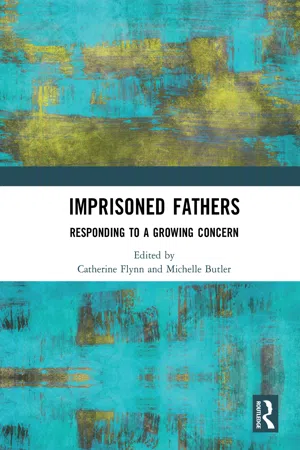
- 118 pages
- English
- ePUB (mobile friendly)
- Available on iOS & Android
About This Book
This volume specifically examines current concerns about imprisoned fathers and highlights best practices with a group of children and parents who present significant vulnerabilities. It brings together contemporary works in this area, to share and consolidate knowledge, to encourage comparisons and collaborations across jurisdictions, and to stimulate debate, all with the aim of furthering knowledge and improving practice in this area.
Although there is considerable focus on imprisoned mothers, there is limited knowledge or understanding of the needs, experiences, or effective responses to imprisoned fathers and their children, despite men making up the vast majority of the prison population. The ongoing and negative impact of parental incarceration on children is well documented, and includes emotional and behavioural consequences, marginalisation, and stigma, as well as financial and social stresses. However, understanding of these processes, and, importantly, what can assist children and families, is poor.
This book seeks to add to the understanding of paternal imprisonment by providing an in-depth exploration of how the arrest, detention, and experiences of fathers during imprisonment can affect their ability to parent and meet the needs of their children. This book was originally published as a special issue of Child Care in Practice.
Frequently asked questions
Information
“They Didn’t Even Let Me Say Goodbye”: A Study of Imprisoned Primary Carer Fathers’ Care Planning for Children at the Point of Arrest in Victoria, Australia
In Victoria, data indicates that in 2013–2014 there were 74,992 adult male arrests, yet little formal attention has been paid to the parenting status of these men, despite knowledge of the impact of parental arrest and incarceration on children being well established. This article addresses a gap in the literature by providing new insights into the experiences of arrest of 34 primary carer fathers incarcerated in Victoria. It examines how incarcerated primary carer fathers experience planning processes for their children at the time of arrest and what factors facilitate or hinder the planning process. To do so, the article draws on data gathered for an Australian Research Council funded study conducted in Victoria and New South Wales between 2011 and 2015. Key issues include: the primary location of paternal arrest; the presence, or absence, of children at the location at which the arrest is made; police awareness of children; and subsequent discussions between police and fathers about suitable care. Findings indicate that half of all arrests took place in the family home. Children were present in 10 of these arrests and half were characterised by force, a large number of police, or weapons. Findings also indicate that in around one-half of all arrests, children were not physically present, despite fathers continuing to have responsibilities for these children. Despite 27 of the arrested men reporting that the police were aware (or made aware) of their children, almost all of these men (n = 26) were not asked about suitable care even when their children were physically present. Overall qualitative findings depict an absence of any discussion about children between police and fathers during the arrest process. The study highlights the demand for guidelines regarding child sensitive practice when a primary carer father is arrested.
Introduction
Review of literature
Parental incarceration and children
Parental arrest
Formal responses to children at parental arrest
Table of contents
- Cover
- Half Title
- Title Page
- Copyright Page
- Table of Contents
- Citation Information
- Notes on Contributors
- Introduction: Imprisoned Fathers—Responding to Children
- 1. “They Didn’t Even Let Me Say Goodbye”: A Study of Imprisoned Primary Carer Fathers’ Care Planning for Children at the Point of Arrest in Victoria, Australia
- 2. The (Dis)continuity of Parenthood Among Incarcerated Fathers: An Analysis of Caregivers’ Accounts
- 3. Developing a Child’s Right to Effective Contact with a Father in Prison—An Irish Perspective
- 4. Recruiting, Retaining and Engaging Men in Social Interventions: Lessons for Implementation Focusing on a Prison-based Parenting Intervention for Young Incarcerated Fathers
- 5. Allowing Imprisoned Fathers to Parent: Maximising the Potential Benefits of Prison based Parenting Programmes
- 6. Does Fatherhood Training in Prison Improve Fathering Skills and Reduce Family Challenges?
- 7. Imprisoned Fathers and their Children: A Reflection on Two Decades of Research
- Index